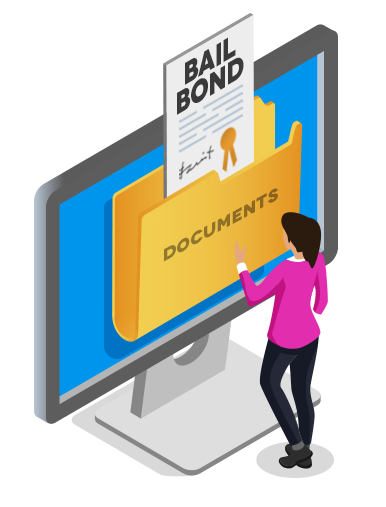
for Bondsmen
Maximize Efficiency
- Calls to the jail are a thing of the past; up to date electronic inmate data is at your fingertips
- Generate bail bonds at anytime from anywhere
- Never miss a walk-in again

Increase Profits & Eliminate Wasted Time
- Bond applications can be created in four simple clicks
- Preserve your sanity and never spend another minute standing in line at the jail
- Significantly lower paper and printing expenses

Simplify Bond Documents & Fee Payments
- Electronic powers can be managed, added, and restored quickly
- All fee payments are made online, eliminating the need for stacks of money orders and petty cash
- Say goodbye to messy papertrails

A Quick Guide to Bond Types in eBONDS
Surety Bonds
Surety bonds can be backed by either insurance or collateral. For insurance-backed bonds, eBONDS connects directly to insurance carriers through a separate portal, allowing bonding companies to receive electronic powers of attorney instantly, and removing the need for paper bonds and POA documents. With eBONDS, bonding agents can submit the bond, bond fees, and Power of Attorney for an inmate to the jail electronically, all at once. The jail then reviews and approves the documents through eBONDS. Once approved and signed by the inmate, the bonding company gets certified digital copies of the bond, Power of Attorney, and receipt. Administrators can also track their company’s collateral or electronic powers limits and allocations in real time.
Recognizance Bonds
Similar to a Pre-Trial Bond, and also known as OR, ROR, or Personal Bond, Recognizance Bonds can be completed through eBONDS. Typically, the jail receives a court order or an authorization to release an inmate based on specific charges. The jail updates the bond type in their Jail Management System (MS), logs into eBONDS, selects the inmate and charges, documents who authorized the release, and completes the bond electronically in eBONDS.
Attorney Bonds
In the State of Texas, a licensed attorney assigned to or retained to represent an inmate can post a bond, acting as the surety. Once the jail approves, attorneys can log into eBONDS, like a bond company would use eBONDS, and post their bond electronically. If the county chooses to accept in-person attorney bonds only, the jail officer can initiate and complete the bond in eBONDS.
Cash Bonds
Cash bonds can be paid in person at the jail or via a third- party online bond payment portal. eBONDS can integrate with third-party cash bond payment solutions to ensure the payor and receipt information is correctly and electronically transmitted. Whether the bond is paid in person or online, a record of the bond payment is imported into eBONDS so the jail can review and approve the bond to be processed and finalized.
Property Bonds
In some jurisdictions, a property owner can offer their home, business, or land as collateral instead of paying a bond The process varies by jail but typically requires the owner to bring appraisal and mortgage documents to the Clerk’s Office for approval and certification. These approved / certified documents are then presented to the jail, where a jailer initiates the bonding process in eBONDS. The jailer selects the inmate for whom the bond is being posted and enters the required information, such as the property owner’s name, address, and the property’s value or equity. The bond is then completed, and the inmate electronically signs the bond. The county or parish then places a lien on the property used as collateral.
Learn more about how eBONDS works!